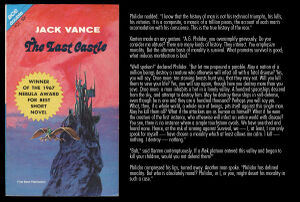The Last Castle (nonfiction)
The Last Castle is a science fiction novella by American writer Jack Vance published in 1966. It won the 1966 Nebula Award for Best Novella and the 1967 Hugo Award for Best Novelette. It is about a future civilization of wealthy nobles who live in high-tech castles, which are maintained by an enslaved alien race, the Meks. After centuries of slavery, the Meks revolt, destroying the castles and slaughtering their elite inhabitants, until only one castle is left.
Philidor and Xanten
Philidor nodded. "I know that the history of man is not his technical triumphs, his kills, his victories. It is a composite, a mosaic of a trillion pieces, the account of each man's accomodation with his conscience. This is the true history of the race."
Xanten made an airy gesture. "A.G. Philidor, you oversimplify grievously. Do you consider me obtuse? There are many kinds of history. They interact. You emphasize morality. But the ultimate basis of morality is survival. What promotes survival is good; what induces mortifaction is bad."
"Well spoken!" declared Philidor. "But let me propound a parable. May a nation of a million beings destroy a creature who otherwise will infect all with a fatal disease? Yes, you will say. Once more: ten starving beasts hunt you, that they may eat. Will you kill them to save your life? Yes, you will say again, though here you destroy more than you save. Once more: a man inhabits a hut in a lonely valley. A hundred spaceships descend from the sky, and attempt to destroy him. May he destroy these ships in self-defense, even though he is one and they are a hundred thousand? Perhaps you will say yes. What, then, if a whole world, a whole race of beings, pits itself against this single man. May he kill them all? What if the attackers are as human as himself? What if he were the creature of the first instance, who otherwise will infect an entire world with disease? You see, there is no instance where a simple touchstone avails. We have searched and found none. Hence, at the risk of sinning against Survival, we — I, at least; I can only speak for myself — have chosen a morality which at least allows me calm. I kill — nothing. I destroy — nothing."
"Bah," said Xanten contemptuously. If a Mek platoon entered this valley and began to kill your children, would you not defend them?"
Philidor compressed his lips, turned away. Another man spoke. "Philidor has defined morality. But who is absolutely moral? Philidor, or I, or you, might desert his morality in such a case."
In the News
Fiction cross-reference
Nonfiction cross-reference
External links
- Jack Vance @ Wikipedia
- Post @ Twitter (22 September 2022)
